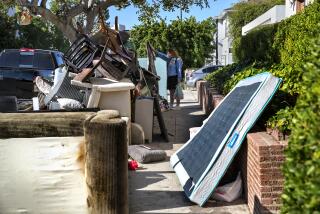Students Find Truth, Conjecture in Trash : Sociology: The members of a Maine college class drew generally accurate conclusions of lifestyles by sifting garbage.
- Share via
ORONO, Maine — Stephen Hyatt wanted his University of Maine sociology students to understand the important clues that can be contained in trash, so he turned them loose on five big green trash bags right in his classroom.
The trash, collected and screened by Hyatt, included everything from food scraps to lottery tickets, beer cans to shampoo bottles. The students came to some accurate conclusions in most cases, and some wildly inaccurate conclusions in others.
Hyatt’s point was to show how everyday dumpings can provide broad details of a civilization’s day-to-day activities. In the past, he said, anthropologists often concentrated on tombs that provided much information about a society’s upper class, but few details about the common people.
To control the exercise, Hyatt put the trash bags together himself, using trash from his own home and from the homes of friends and neighbors.
“I assembled this trash for specific reasons, and in order not to detract from the learning experience I washed all the cans and bottles so that all the trash was relatively clean,” Hyatt said.
Each bag of trash represented a hypothetical family, and each bag contained specific clues about the family members.
The class was divided into groups, with teams of five students assigned to each bag of trash.
“They examined the trash and tried to make some meaning of the contents,” Hyatt said. “Then each one was asked to make inferences about the trash.”
Hyatt asked the students to draw conclusions about a number of specific questions: the size of the household; the age, sex, health and occupations of the members; and the food consumed by the different families.
“They were also to try to determine the social status of the household, whether they were poor or upper class,” Hyatt said.
What surprised Hyatt the most, he said, was the students’ attention to food scraps and other food-related clues. The students were also very conscious of health-related clues, he said.
“They were very alert to that, pointing out that this person ate low-cholesterol food or drank low-fat milk, and that surprised me,” Hyatt said. “It also surprised me how often they noticed evidence of food from McDonald’s or other fast-food places, pointing out that some of the fictitious families usually ate well but slipped once in a while and ate fast-food.”
Some students interpreted the discovery of aspirin and Tylenol bottles in the bags as evidence that the people were living stressful lives and needed relief from medication.
He said the students came to interesting conclusions about the lottery tickets that he placed in the trash bags.
“Some said that the gambling was probably the result of feelings of poverty and desperation,” he said. “One student pointed out that a lottery ticket had been purchased on Dec. 24, and said it must have been a sad Christmas Eve. He related that to desperation, frustration and money problems.”
The discovery of empty beer cans indicated that the male of the household was drinking, even when the household obviously had both male and female members, Hyatt said. Some students said it was an indication that the male in the family was drinking too much.
“That surprised me in a way,” Hyatt said. “Many people now would say that the co-eds are drinking as much beer as the males, but the students seemed to think that it indicated a male presence.”
Hyatt designed his trash bags to represent economically well-off families. But many of his students thought the families were poor.
“Most of them came to the conclusion that they were worse off than I had intended,” Hyatt said. “Many of them noticed evidence of clothes purchased in discount stores, and thought that indicated poverty. They thought that buying no-name food products indicated low incomes. They didn’t think that it might be a middle-class family that simply wanted to save money.”
Hyatt said he plans to repeat the trash exercise in future classes. And at least one student said the experiment will change the way she handles her own trash in the future.
“I never believed that you could find out so much revealing information about people simply by examining their trash,” she wrote in her research paper. “From now on I plan to destroy any personal information before throwing it out.”
More to Read
Sign up for Essential California
The most important California stories and recommendations in your inbox every morning.
You may occasionally receive promotional content from the Los Angeles Times.













